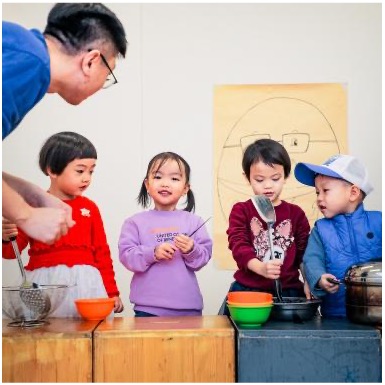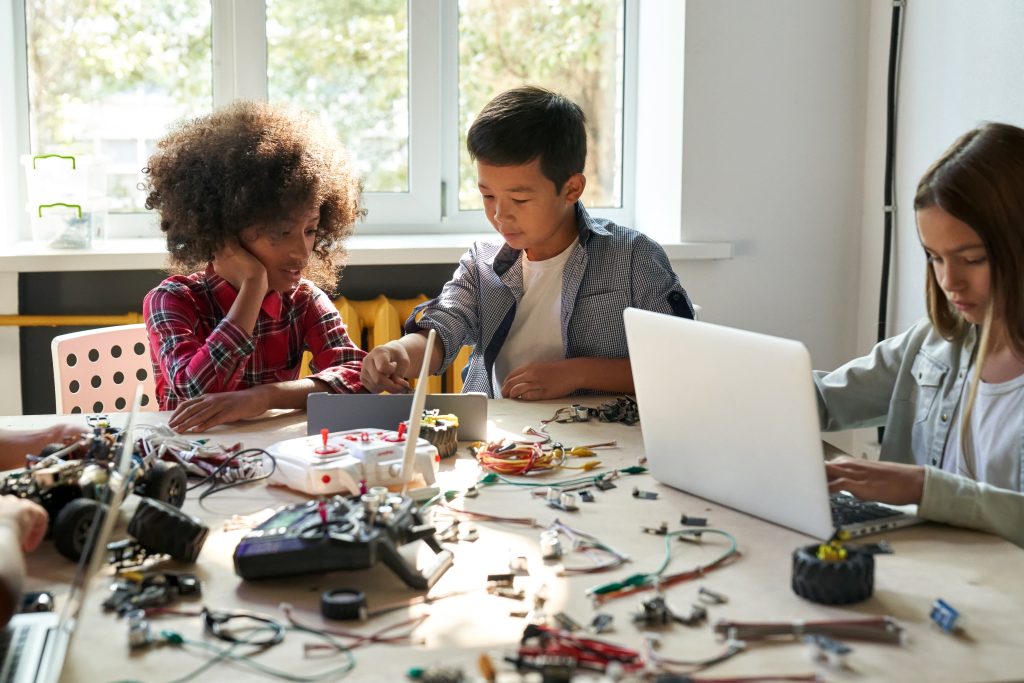Every great idea starts with a curious mind. Young innovators are often born with a natural drive to learn and create, but reaching their full potential requires nurturing environments where their talents can blossom. That’s the gift of school.
Within the welcoming walls of every classroom, the seeds of discovery are planted each day. When children attend school consistently, their innate curiosity takes root. New skills are cultivated, ideas are sparked and knowledge builds layer upon layer. Educators fuel inquisitive minds by opening doors to STEAM and more.
A quality education gives all students the tools and strong foundations to develop their unique talents and abilities fully. This blog will explore why school is important in cultivating young minds and empowering children to thrive.
Learning Foundational Skills
Children are first introduced to basic skills like reading, writing and mathematics at school. Mastering foundational skills allows students to communicate their ideas and think logically and effectively. Education in the early years prepares young minds with tools to solve problems creatively as they grow older. Children are exposed to various subjects that help uncover their interests and strengths at school. For example, students interested in science may develop new technologies after gaining knowledge in physics, chemistry and/or biology classes. Those inclined towards the arts may pioneer different forms of cultural expression. A well-rounded education equips children with diverse skills and perspectives to become pioneering thinkers.
Developing Analytical and Critical Thinking
School goes beyond teaching facts to develop higher order thinking abilities. Through projects, group work and subject-based learning, students are encouraged to analyse information, think logically to arrive at conclusions and think critically to solve problems. These skills of evaluation, reasoning and open-minded thinking are invaluable for innovators. They help view conventional concepts with a fresh lens to develop disruptive yet practical solutions. Analytical skills also allow innovators to identify limitations in existing systems and develop ways to overcome them through new approaches and methods. By fostering analytical and critical thinking, the school nurtures competent problem-solvers of tomorrow.
Promoting Creativity and Imagination
A thriving learning environment at school nurtures creativity by celebrating diverse ideas, encouraging questioning and risk-taking. When children gain confidence in expression, their imagination and innovative potential bloom. Subjects like visual arts, music and design kindle creative spirit in students through hands-on learning. Why is education important? It awakens imagination, vital for innovating, as imagining possibilities is the first step towards bringing new ideas to life. Creativity also stems from cultural exposure gained through school trips, shows or international days, which broaden perspectives. A creative school experience lays the foundation for students to envision solutions never thought of before.
Cultivating Collaboration Skills
Today’s world demands cooperation and teamwork more than ever. Through group activities, projects and real-world simulations, schools hone collaboration skills in students. Learning to communicate, listen, negotiate and motivate each other effectively prepares tomorrow’s pioneers to work across disciplines, embrace diversity of thought and find synergies that lead to ground-breaking innovation in schools and beyond. Successful innovations often emerge from ideas built upon, improved and actualised through collaboration between multiple individuals over time. The collaborative ethos developed during school years sets the stage for students to drive progressive changes through co-operation in their careers and communities.
Exposure to Role Models and Mentors
The school provides exposure to talented role models; exceptional teachers, industry experts or innovators who visit to share their journeys. Such interactions ignite a spark in curious minds and expand their vision of possibilities. Knowledgeable mentors guide students towards opportunities, coach new skills and help channel their talents meaningfully. Quality schooling creates a fillip for innovators by connecting them to support systems and resources that take their aspirations to new heights. Exposure at school also plays a role through inspirational stories shared in classes and activities celebrating innovators who changed the world with their ideas.
Developing Perseverance and Grit
Challenging academics, co-curricular activities and responsibilities at school build vital traits of perseverance and resilience in students to face setbacks. Learning to cope with stress, work hard, follow through on commitments and be proactive enhances grit, passion and perseverance, which are a must for innovators to pursue their visions against all odds. Periods of failure and self-doubt are inevitable for pioneering thinkers, but robust schooling equips them with inner strength and a problem-solving attitude to learn from mistakes and sustain the drive to transform an idea into reality despite hurdles. Education cultivates qualities that help push boundaries with determination, despite challenges.
Nurturing Leadership Skills
Schools cultivate leadership skills through positions of responsibility such as; prefect, club leader, and event co-ordinator. Organising peers, managing timelines and solving problems nurture a growth mindset and interpersonal skills crucial for driving positive change. Clear communication and the ability to motivate others are vital leaders’ strengths that guide innovation.
Fostering a Growth Mindset
A growth mindset believes capabilities can be enhanced through effort and experience over fixed traits. Schools encourage this empowering philosophy by praising effort over innate intelligence, celebrating learning from mistakes, welcoming complex tasks for mastery and viewing challenges as opportunities rather than threats.
Personality Development
The importance of education in personality development cannot be overstated. Education plays a crucial role in shaping students’ personalities by instilling values, nurturing creativity and fostering social and emotional intelligence. One of the primary ways education contributes to personality development is through the acquisition of knowledge and skills. Schools equip individuals with a wide range of information, from academic subjects to practical know-how, which expands their perspectives and allows them to make informed decisions. By promoting moral and ethical values, education helps individuals develop a strong sense of integrity, compassion and social responsibility, which are essential aspects of a well-developed personality.
Extra-curriculum Activities That Might Be of Interest:
These carefully selected programs provide diverse learning experiences that promote critical skills in young learners, from creativity and problem-solving to technological literacy and strategic thinking. Each program empowers students to take on challenges with confidence, helping them grow into well-rounded, innovative thinkers.
Get a special discount by quoting code AISLMALL during CHECKOUT.
Cobo Academy

Hong Kong’s Cobo Academy offers introductory course on artificial intelligence (AI) and machine learning (ML) for students aged 12 and up teaches essential AI concepts and the fundamentals of Microsoft Azure’s AI services. Through this program, students learn how to apply AI to solve real-world problems using structured data, text, images, and speech. As a Microsoft in Education partner, Cobo Academy offers a robust curriculum that prepares students for a future in technology by combining foundational knowledge with practical skills.
Drama Rainbow Education (Online and China)

Drama Rainbow Education (DRE) Learning Lab (China) applies Drama in Education techniques to foster active learning in children aged 5-11. Small-group classes immerse students in storytelling and dramatic exploration, encouraging empathy, creativity, and collaboration. By thinking deeply and engaging in role-play, students build communication and social intelligence, equipping them with essential life skills for leadership and teamwork.
Minecraft Modding by Create & Learn

Create & Learn’s Minecraft Modding courses (online) engage students with an introduction to programming through Minecraft, a globally popular game. Starting with circuits and engineering concepts using Minecraft’s redstone blocks, students progress to advanced modding techniques, learning coding essentials like loops, conditionals, and functions. Through game-based learning, students gain valuable skills in coding while creating mini-games and solving puzzles, making it ideal for young innovators interested in technology.
The Chess Academy

Hong Kong’s leading chess program, The Chess Academy, helps students develop strategic thinking and decision-making skills under the tutelage of Grand Masters and certified FIDE coaches. The program’s structured lessons and competitive play foster resilience and critical thinking—essential qualities for future leaders. The Chess Academy not only enhances students’ abilities in chess but also builds intellectual agility and confidence.
By engaging in these enriching activities, students not only broaden their skill sets but also build resilience and curiosity, essential for future leadership and innovation. From AI and robotics to coding, chess, and drama, these programs unlock new avenues for exploration and personal growth, supporting students as they become the trailblazers of tomorrow.










